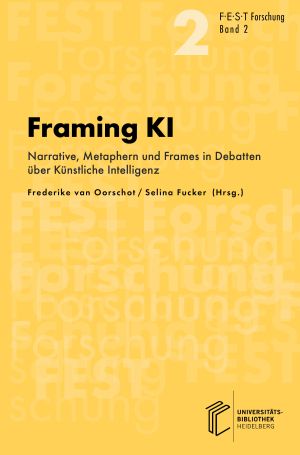
How to Cite
van Oorschot, Frederike and Fucker, Selina (Eds.): Framing KI: Narrative, Metaphern und Frames in Debatten über Künstliche Intelligenz, Heidelberg: heiBOOKS, 2022 (FEST Forschung, Volume 2). https://doi.org/10.11588/heibooks.1106
License

This work is licensed under a Creative Commons Attribution-NoDerivatives 4.0 International License.
Identifiers
ISBN 978-3-948083-68-7 (PDF)
ISBN 978-3-948083-69-4 (Softcover)
Published
09/29/2022
Framing KI
Narrative, Metaphern und Frames in Debatten über Künstliche Intelligenz
In social, political and media debates, "artificial intelligence" is described as a savior, extension or threat to humans. These descriptions construct social imaginations that frame individual and societal discourse about AI. The volume combines case studies of these frames, narratives and metaphors with a reflection on the associated ethical questions under the task of imagination-sensitive ethics. It thus offers the first interdisciplinary introduction to the imagination of artificial intelligence from media studies, communication studies, linguistics, film studies and media ethics.
Chapters
Table of Contents
Pages
PDF
I. Fallstudien
Filmische Science-Fiction und alltagsweltliche Online-Diskussionen
15-54
Reflections on the Role and Purpose of Complex Data Processing in Digital Media Transformation
55-80
Zur emotionalen Wirkung der medialen Berichterstattung über künstliche Intelligenz
81-108
II. Medienethische und -philosophische Reflexion
Theologisch-ethische Herausforderungen der Vorstellungswelten künstlicher Intelligenz
111-135
Das Verhältnis von Diskursanalyse und Angewandter Ethik im Feld der Künstlichen Intelligenz
137-154
Zur Hermeneutik der Zwischenwesen – zwischen Mensch und Maschine
155-176
III. Fazit


